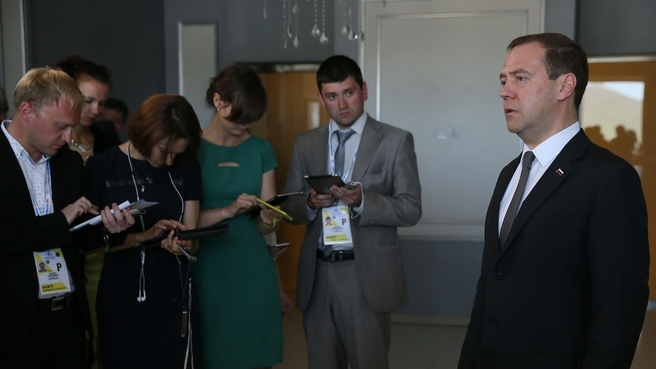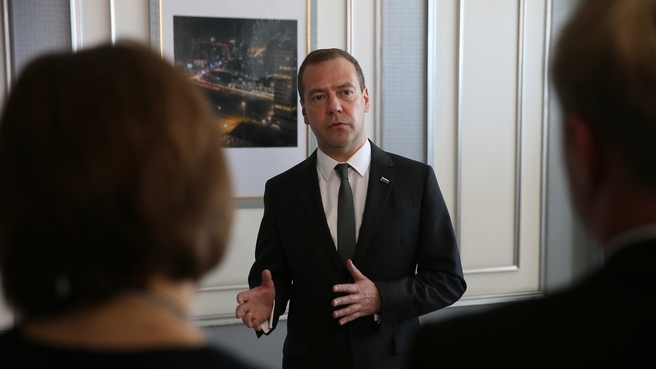The Prime Minister answered journalists' questions on the outcome of the 11th Asia-Europe Meeting (ASEM11) Summit.
Transcript:
Question: The summit lasted only a day and a half, but two major events occurred during this time: the terrorist attack in Nice and the military coup in Turkey, an attempted coup. How did these events affect the agenda, and how did you and your partners assess these events?
Dmitry Medvedev: Indeed, since we have been here in Ulaanbaatar, two high-profile events did happen. One was the terrorist attack in Nice. Assessments have been made, both here at the ASEM forum, and certainly in Russia by the President of our country. I made a statement yesterday. It was an utterly inhumane terrorist act, which deserves strong condemnation. It affected people from various countries. Unfortunately, Russia lost lives, including adults and children. Our task now is to combine efforts to fight evil.
Visit
-
Dmitry Medvedev’s conversation with President of the Czech Republic Milos Zeman
-
Dmitry Medvedev’s meeting with President of Cyprus Nicos Anastasiades
-
Dmitry Medvedev’s conversation with the Prime Minister of the Kingdom of the Netherlands Mark Rutte
-
Dmitry Medvedev’s conversation with the Chancellor of the Federal Republic of Germany Angela Merkel
-
Dmitry Medvedev’s conversation with the President of the Swiss Confederation Johann Schneider-Ammann
-
Meeting with Chairman of the State Great Hural of Mongolia Miyeegombyn Enkhbold
-
Meeting with Prime Minister of Mongolia Jargaltulga Erdenebat
As for the events that took place in Turkey, these have yet to be analysed. It is obvious that armed clashes are still occurring. But, naturally, it is essential that constitutional order be restored in the country, Russia’s neighbour, that all the rights and freedoms stipulated by legislation be respected.
At the same time, what happened shows that deep and powerful controversy, which brought about these events, is at work in the army and society of the Republic of Turkey.
What will happen next remains to be seen, but in any case, we will make every effort to protect the interests of our citizens and our companies, our legal entities. This applies to air service and other transport links with Turkey. This also applies to ships and other vehicles that are travelling to Turkey or are there now. Relevant orders have been issued to the Ministry of Transport and other agencies on the President’s and my instructions.
Question: Mr Medvedev, I would like to return to the summit agenda. How would you assess the results, how effective is this format and what is Russia’s role in the Europe-Asia dialogue?
Dmitry Medvedev: Such forums are, essentially, platforms for general, free-style discussions. Here at the ASEM Summit, Europe and Asia literally meet to discuss all the issues that concern both European and Asian countries.
The summit participants have discussed a variety of issues, including the economy, transport, logistics, new opportunities, and major projects. Today's debate was largely devoted to security.
The main point of these summits is that Asian and European partners coordinate approaches, which is really important for eventually making binding decisions.
This certainly concerns fighting terrorism, and several other issues.
Question: Mr Medvedev, you had several bilateral meetings on the sidelines of the summit, most of them with heads of delegations from Europe. Does this mean that the Europeans are heading for a rapprochement because they are tired of the anti-Russian sanctions?
Dmitry Medvedev: I really had a lot of meetings; they were all productive, as we discussed a variety of issues.
As for the sanctions, our country has a clear and simple stance: we were not the ones who imposed these sanctions. The European Union itself needs to decide what to do next. Unfortunately, so far, we have not seen any moves on the EU's part to lift the sanctions. As you know, decisions have been made recently to renew them.
But everyone I talked to, without exception, agreed that these sanctions are detrimental to economic relations. International experts estimate the damage done to the West by the sanctions against Russia at about $100 billion. Russia has had losses as well, and they are big enough.
How could they have lost $100 billion? Through shortfall of profit for Western companies. Therefore, it is obvious that the sanctions are becoming obsolete, but we have not discussed this in practical terms. Time has shown that, even in such circumstances, we are still able to grow.














